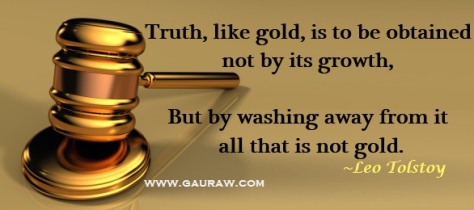We all seek truth and debate fiercely over it. Sometimes truth is for the truth’s sake, sometimes it is for justice, and so on.
Every time we begin the debate, we get lost in the conception if truth. Some say truth is subjective, some say it is objective. So begins the metadebate – the secondary debate, the debate over the debate.
Okay, so can we find a guideline, a spark that helps us move on? Can we have a hint that is acceptable for the objectivists and the subjectivists alike?
Well, consider the following Shloka-15 from the Ishavasya Upanishada (ईशावास्य उपनिषद) that says:
“The mouth of the truth is covered with gold. Pushan! Please uncover it for the benefit of the people who want to follow the path of Truth.”

Source: http://bit.ly/1kuETnN
Pushan is the ancient Sun God from the vedic times. He causes and safeguards meetings and journeys. So, credit is given to Pushan for marriages, journey of the souls to the other world and protection of travelers from troubles including those by other men. So, he lights up the paths, protects the roads and protects those who follow it.
Now, consider the meaning of the words “Truth” and “Gold”. Obviously, if you upturn a bar of gold at the jeweller’s or in your locker, you are not going to read a sign that reads “Here lies the truth”. These are loaded words – with other meaning.
In an objectivist view of truth, truth is context independent and universal. There is nothing like your truth and my truth. Whether you have a different experience or justification, so be it. Truth kind of exists outside of how you feel about it and it will decide if you are on its right side of it or wrong. In this view, those on the wrong side also know that they are on the wrong side – just like interpreting a law book.
So, what would you do if you were not within the circle of truth? In the real world, everyone has some means or the other, and when the matter is important and the circle of truth has evaded you, you will try to block it by using whatever means you can. That ‘whatever means’, anything of value, is gold. If this were not true, how would we see examples every day where someone waves the flag of humanity, but denies killing of six people – however unintentionally? Not only them, but thousands of their fans also join the parade??

Source: http://bit.ly/1Rx4mI4
Not surprising that several people have thought like this, is it? Okay – now coming to the other conception of Truth, where it changes color according to your scheme of things. The truth would be that whatever be *your* truth, *my* truth is different. So, if you think that salvation is your truth, then you do something and then if wealth is your truth, then you do different things.
The Ishopanishad says that however we conceive our truth, we get lost either in defenses, or in instrumentalities, or in the means of achieving the ends.
That is a lost way.
We need the light of realization, that there is something like, “No *path to* truth, truth *is* the path.”
It seems to me that one needs some kind of grace or blessing to come upon realizations such as this. One needs to pass through experience, fall in harm’s way and live to tell – that is why the request is made to Pushan.
And that is why, perhaps, in the same Upanishad, the seer defines what happens when the light of realization is not shining:
“The realms covered by the darkness of inaction, procrastination and indifference (तमस्/Tamas) are Asurya (असूर्य). Those non-dead who annihilate themselves by refusing to see the light (of realization), are destined for those realms.” (Ishavasya Upanishad: 3)
असूर्या नाम ते लोका अन्धेन तमसावृत्ता: ।
तांस्ते प्रेत्याभिगच्छन्ति ये के आत्महनो जना:॥ (ईशा. ३)
Therefore, it is important to first relinquish – be ready to part with, and therefore be as if it never existed, or you never possessed it. That ‘it’ is everything that you may care for, whether truth as an objective reality or subjective. And all the instrumentalities that come bundled with it.
तेन त्यक्तेन भुङ्जीथा: मा गृध: कस्यस्विद्धनम्। (ईशा: १)
And that should not be difficult if you have understood that just like the mathematical conception of infinity, your belief system, your perceptual world, is complete in itself. All the derivatives of that complete system are also complete, and they complete your reality. Since ‘complete’ is the only denomination you have, then if you removed ‘complete’ from the ‘complete’, only the ‘complete’ will remain. (Ishavasya Upanishad: Shantipaatha)
ॐ पूर्णमद: पूर्णमिदम् पूर्णात्पूर्णमुदच्यते।
पूर्णस्य पूर्णमादाय पुर्णमेवावशिष्यते ॥ (ईशा. शांतिपाठ:)

Source: http://bit.ly/1kuFXrV
So, what is the risk in complete relinquishing? Complete seeking?
Take a leap of faith!!

Objective truth never had the central position in the search of truth in the ancient world. It was accepted as necessary but subordinate to the higher truths revealed through ‘grace’, or ‘tapas’. Heidegger makes an important distinction between truth as the ‘unhiddenness of beings’ and truth as the ‘correctness of propositions’. He says that it is by neglecting the former primordial concept of truth in favour of the latter derivative concept that Western philosophy, beginning already with Plato, took off on its ‘metaphysical’ course towards bankruptcy of the present day.
(Martin Heidegger, The Essence of Truth, page xiv)
Focusing on truth as the correctness of propositions takes us in the realm of logic, reason, empiricism, which though true, give us only a partial view of reality. Ayurveda says – Pratyaksham Alpam, Apratyaksham Analpam. The seen, heard, tasted, touched and smelt is a very miniscule part of our reality. What lies beyond is much greater. We have reduced the richness of life to numbers and formulas and calculations. It will be interesting the explore the origins of Statistics. Statistics reduces reality into standard representations of reality – the averages and dispersions.
Truth lies outside the normal distribution curve of statistics !!
LikeLike
Just noted the following from the Kenopanishad:”If you think that it (the Brahman/ultimate reality) cannot be known, knows it and those who believe that I know it, do not know it. Because those who take pride in claiming that they know it, do not know it but the man who does not take pride knows it.” Isn’t there something similar in case of Truth also? It lies beyond classifications and categories, although you cannot say it is not in there. So, I said that we need to put a parenthesis over all those notions and go beyond.
LikeLike
It is a beautiful Upanishad. Vanraj Bhatia in his Album ‘Ananta’ has put to music verses 1.5 to 1.9 in the voice of Ravindra Sathe. The musical effect is revealing.
Yes, those who know do not speak. Those who speak about it do not know. Maharshi Ramana hardly gave lectures. Lecturers hardly know the truth.
From the Book of Mirdad, by Mikhail Naimy, page 128,
Avoid disputes. Truth is an axiom; it needs no proof. Whatever must be propped with argument and proof is soon or late knocked down with proof and argument. To prove a thing is to disprove its opposite. To prove its opposite is to disprove it.
God has no opposites. How shall you prove or disprove Him?
To be a conduit for Truth the tongue must never be a flail, a fang, a weather-vane , an acrobat, or a scavenger.
Speak to relieve the speechless. Be speechless to relieve yourselves.
page 116,
A constant friction is duality; and the friction gives the illusion of two opposing sides bent upon self-extermination. In truth the seeming opposites are self-completing, self-fulfilling and
working hand in hand to one and the same end – the perfect peace, and unity, and balance of Holy Understanding . but the illusion is rooted in the senses, and it persists so long as the
senses persist.
LikeLike
Alas! Sometimes a lifetime passes without coming across even an iota of this eternal beauty of truth.
LikeLike
The first photograph chosen is very apt. One actually experiences as if the golden lid is covering the face of the truth. Ramanuja interprets the golden lid as our passions – Rajas, which keeps us entangled in the web of our desires and we are unable to realise the truth. In his interpretation :
Face of the truth – Mind
Truth – Atman
Golden lid – Rajas, passions, desires.
The mind when it is busy and tied up with ‘objective’ truths of our phenomenal world, covers the truth. It is only when it is stilled, made silent, (Chitta Vritti Nirodhah – Patanjali) that we can know the truth.
This was known, accepted and acknowledged in all the ancient traditions of the world. To know and understand this requires a leap of faith. When you become nothing, you are everything.
A sample from the Chinese tradition :
THE MIND OF ABSOLUTE TRUST
BY SENG-T’SAN
The great way isn’t difficult for those who are unattached to their preferences. Let go of longing and aversion, and everything will be perfectly clear.
When you cling to a hairbreadth of distinction, heaven and earth are set apart.If you want to realize the truth, don’t be for or against.
The struggle between good and evil is the primal disease of the mind.Not grasping the deeper meaning, you just trouble your minds serenity.
As vast as infinite space, it is perfect and lacks nothing.
But because you select and reject, you can’t perceive its true nature.
Don’t get entangled in the world; don’t lose yourself in emptiness.
Be at peace in the oneness of things, and all errors will disappear by themselves.
If you don’t live the Tao, you fall into assertion or denial.
Asserting that the world is real, you are blind to its deeper reality;
denying that the world is real, you are blind to the selflessness of all things.
The more you think about these matters, the farther you are from the truth. Step aside from all thinking, and there is nowhere you can’t go.
Returning to the root, you find the meaning;
chasing appearances, you lose their source.
At the moment of profound insight, you transcend both appearance and emptiness.
Don’t keep searching for the truth; just let go of your opinions.
For the mind in harmony with the Tao, all selfishness disappears.
With not even a trace of self-doubt, you can trust the universe completely. All at once you are free, with nothing left to hold on to.
All is empty, brilliant, perfect in its own being.
In the world of things as they are, there is no self, no non self.
If you want to describe its essence, the best you can say is “Not-two.” In this “Not-two” nothing is separate, and nothing in the world is excluded.
The enlightened of all times and places have entered into this truth. In it there is no gain or loss; one instant is ten thousand years. There is no here, no there; infinity is right before your eyes.
The tiny is as large as the vast when objective boundaries have vanished; the vast is as small as the tiny when you don’t have external limits.
Being is an aspect of non-being; non-being is no different from being. Until you understand this truth, you won’t see anything clearly.
One is all; all are one. When you realize this, what reason for holiness or wisdom?
The mind of absolute trust is beyond all thought, all striving,
It is perfectly at peace, for in it there is no yesterday, no today, no tomorrow.
LikeLike
Such are the subjects of everlasting enquiry! They draw people from the world over even if the people (as in case of the picture with the second quote) differ in what they find. I am wondering where we would have been if Shankaracharya was not born. Whether we have his genious or not, our task is same as his: interpret, reinterpret and live what we have. If not, there won’t have been bigger fools thn us.
LikeLike
Yes M’am, the quest for truth has engaged human beings across time and space of our existence. Some people in all lands and at all times of human existence have searched for and have been able to realise and manifest the truth in their lives.
The paths have been different and varied. There is a Buddhist saying that all paths which lead to the truth are like fingers pointing to the Moon. In reality there is no path at all. The so called ‘path’ is like a finger which only indicates, just points out the destination. We, who attempt to know and understand this path by written words are further mislead by the limitations of ‘writing’ and ‘language’. That’s why it is suggested that listening is better than reading, and witnessing someone who has realised the truth is better than reading.
It is the condensed tapas of our forefathers – the Rishis, which creates Shankara and Ramanuja and Sri Ramakrishna and Sri Aurobindo whenever there is a danger of loosing our connection with ‘Truth’.
There is something peculiar about this land – Bharatvarsha. Thousands of Indians leave it every year for a better material life abroad. A few hundred materially prosperous Europeans and Americans leave their everything and come to this land for seeking ‘truth’ which they are unable to find in their cultures. Stephen Mitchell in an interview said that after years of reading about truth and spirituality, he wanted to see and experience this embodied in flesh and blood. After his search, he was told to go to India, where he may find a living master. He started to learn Hindi ( We do our IELTS for English) for this.
Interpret, Re-interpret and Live what we have – Yes, that is the only real work for which we are all here. All great works of art force us to keep re-interpreting our experiences in their light, till all of this is combined in a seamless harmony of existence.
LikeLike
Again- reminds me of Mahabharata. Vyas says that the Vedas disappear at the end of every Yuga. But the rishis, with the help of tapa, find them again, along with the complete history. Such a wonderful spark of hope!
LikeLike